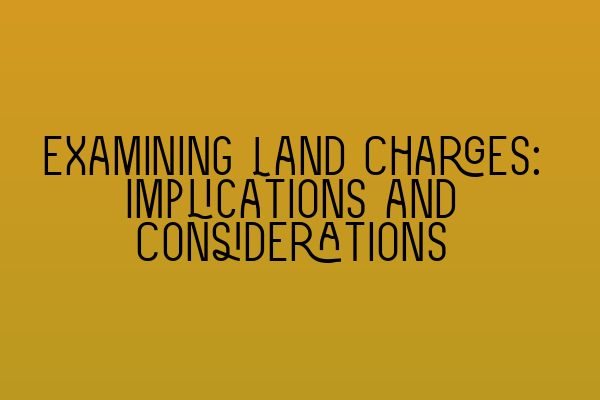Examining Land Charges: Implications and Considerations
Welcome to SQE Property Law & Land Law, where we provide comprehensive legal support and expert advice on all matters related to property law. In this blog post, we will delve into the complex world of land charges and explore the implications and considerations that come with them. Whether you are a property owner, buyer, or legal professional, understanding land charges is crucial to navigating the landscape of property law. So, let’s get started!
What Are Land Charges?
Land charges are legal interests or rights that affect a property. They can restrict the use or transfer of the property, and they must be registered with the Land Charges Department of the HM Land Registry. These charges are typically in the form of financial obligations, such as mortgages, or non-financial obligations, such as restrictive covenants or easements.
Implications of Land Charges
1. Impact on Property Ownership:
Land charges can have significant implications on property ownership. For example, if there is a mortgage registered against the property, the lender has a legal right to repossess the property if the borrower defaults on the loan. As a buyer, it is essential to conduct thorough due diligence to ensure there are no outstanding charges that could potentially affect your ownership rights.
2. Restrictions on Use and Development:
Certain land charges, such as restrictive covenants, easements, or planning restrictions, can limit the use and development potential of a property. These charges may prevent you from making alterations to the property or using it for specific purposes. It is crucial to review these restrictions carefully to determine if they align with your intended objectives for the property.
3. Financial Liabilities:
Land charges, especially mortgages, create financial obligations that need to be taken into account. As a property owner, you will be required to make timely mortgage repayments to avoid default and potential repossession. Additionally, if you are purchasing a property with an existing mortgage, you will need to consider the financial implications and ensure you have the means to fulfill the obligations.
Considerations When Dealing with Land Charges
1. Conducting a Land Charges Search:
Before purchasing a property, it is essential to conduct a land charges search. This search will reveal any registered land charges against the property, allowing you to assess the potential impact on your ownership and intended use. At SQE Property Law & Land Law, we offer thorough land charges searches to ensure our clients have comprehensive information.
2. Seeking Legal Advice:
Navigating the intricacies of land charges can be complex and requires expert legal guidance. Engaging the services of a solicitor specializing in property law is highly advisable. They can provide invaluable advice and ensure you are fully aware of the implications of any land charges associated with a property.
3. Negotiating and Amending Land Charges:
In some cases, it may be possible to negotiate or amend existing land charges to better suit your needs. For example, you may be able to negotiate terms with the mortgage lender or seek a release or modification of restrictive covenants. These negotiations require legal expertise and should be handled by a knowledgeable solicitor.
4. Updating Land Charges Register:
If you have successfully negotiated an amendment or discharge of a land charge, it is crucial to ensure that the Land Charges Department is updated accordingly. Failing to update the register could lead to complications in the future and affect the validity of any agreements made.
Conclusion
Examining land charges is an integral part of property law, and understanding the implications and considerations associated with them is crucial. Whether you are a property owner, buyer, or legal professional, navigating the complexities of land charges requires expert advice and careful consideration. At SQE Property Law & Land Law, we are dedicated to providing comprehensive support and guidance on all matters related to property law. For more information, please visit our website and explore our range of related articles:
– Misrepresentation in Contracts: Unveiling Deceptive Practices
– SQE Contract Law: Analyzing Landmark Cases and Influential Judicial Decisions
– Understanding Contractual Capacity: Rights and Limitations
– Interactive SQE Mock Tests for Contract Law: Test Your Knowledge
– Join Our SQE Contract Law Webinars: Expert Insights and Guidance
Contact us today to learn more about how we can assist you with your property law needs. Our team of legal experts is ready to provide you with the support and advice you require.
Disclaimer: The information provided in this blog post is for general informational purposes only and should not be construed as legal advice. Please consult with a qualified solicitor for specific advice tailored to your individual circumstances.
